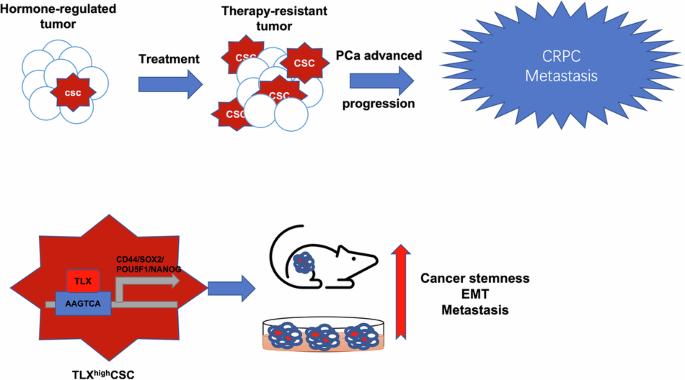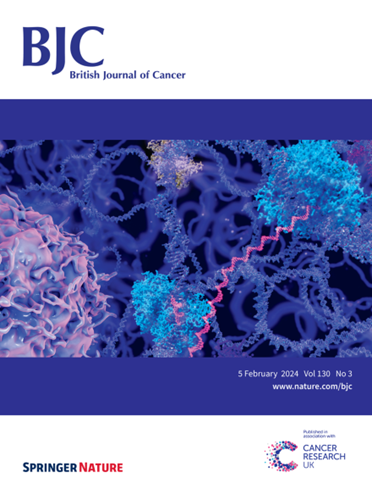Nuclear receptor TLX functions to promote cancer stemness and EMT in prostate cancer via its direct transactivation of CD44 and stem cell-regulatory transcription factors
IF 6.4
1区 医学
Q1 ONCOLOGY
引用次数: 0
Abstract
Prostate cancer stem cells (PCSCs) play crucial roles in therapy-resistance and metastasis in castration-resistant prostate cancer (CRPC). Certain functional link between cancer stemness and epithelial-mesenchymal transition (EMT) is involved in CRPC. However, up-stream regulators controlling these two processes in PCSCs are still poorly understood. Recently, we have shown that orphan nuclear receptor TLX can promote tumour initiation and progression in CRPC by repressing androgen receptor and oncogene-induced senescence. PCSCs were isolated from various prostate cancer cell lines and clinical tumour tissues using multiple methods for various in vitro and in vivo oncogenic growth analyses. Direct targets of TLX involved in stemness and EMT regulation were determined by specific reporter gene assays and ligand-driven modulation of TLX activity. PCSCs isolated from various sources exhibited increased expression of TLX. Functional and molecular characterisation showed that TLX could function to promote cancer stemness and EMT in prostate cancer cells via its direct transactivation of CD44, SOX2, POU5F1 and NANOG, which share certain functional crosstalk in these two cellular processes. TLX could act as a key up-stream regulator in transcriptional control of stemness and EMT in PCSCs, which contribute to their tumorigenicity, castration-resistance and metastasis potentials in advanced prostate cancer.

核受体TLX通过直接反式激活CD44和干细胞调控转录因子,促进前列腺癌的癌症干性和EMT。
背景:前列腺癌干细胞(PCSCs)在去势抵抗性前列腺癌(CRPC)的耐药和转移中发挥着关键作用。癌症干细胞与上皮-间质转化(EMT)之间的某些功能性联系涉及CRPC。然而,人们对控制PCSCs这两个过程的上游调控因子仍然知之甚少。最近,我们发现孤儿核受体TLX可以通过抑制雄激素受体和癌基因诱导的衰老来促进CRPC中肿瘤的发生和发展:方法:使用多种方法从各种前列腺癌细胞系和临床肿瘤组织中分离 PCSCs,进行各种体外和体内致癌生长分析。通过特异性报告基因检测和配体驱动的TLX活性调控,确定了TLX参与干性和EMT调控的直接靶点:结果:从不同来源分离的 PCSCs 都表现出 TLX 表达的增加。功能和分子特性分析表明,TLX可通过直接转录CD44、SOX2、POU5F1和NANOG促进前列腺癌细胞的癌症干性和EMT,而CD44、SOX2、POU5F1和NANOG在这两个细胞过程中具有一定的功能交叉:结论:TLX可能是PCSCs干性和EMT转录调控的关键上游调控因子,而PCSCs的干性和EMT是晚期前列腺癌致瘤性、阉割抗性和转移潜力的关键因素。
本文章由计算机程序翻译,如有差异,请以英文原文为准。
求助全文
约1分钟内获得全文
求助全文
来源期刊

British Journal of Cancer
医学-肿瘤学
CiteScore
15.10
自引率
1.10%
发文量
383
审稿时长
6 months
期刊介绍:
The British Journal of Cancer is one of the most-cited general cancer journals, publishing significant advances in translational and clinical cancer research.It also publishes high-quality reviews and thought-provoking comment on all aspects of cancer prevention,diagnosis and treatment.
 求助内容:
求助内容: 应助结果提醒方式:
应助结果提醒方式:


